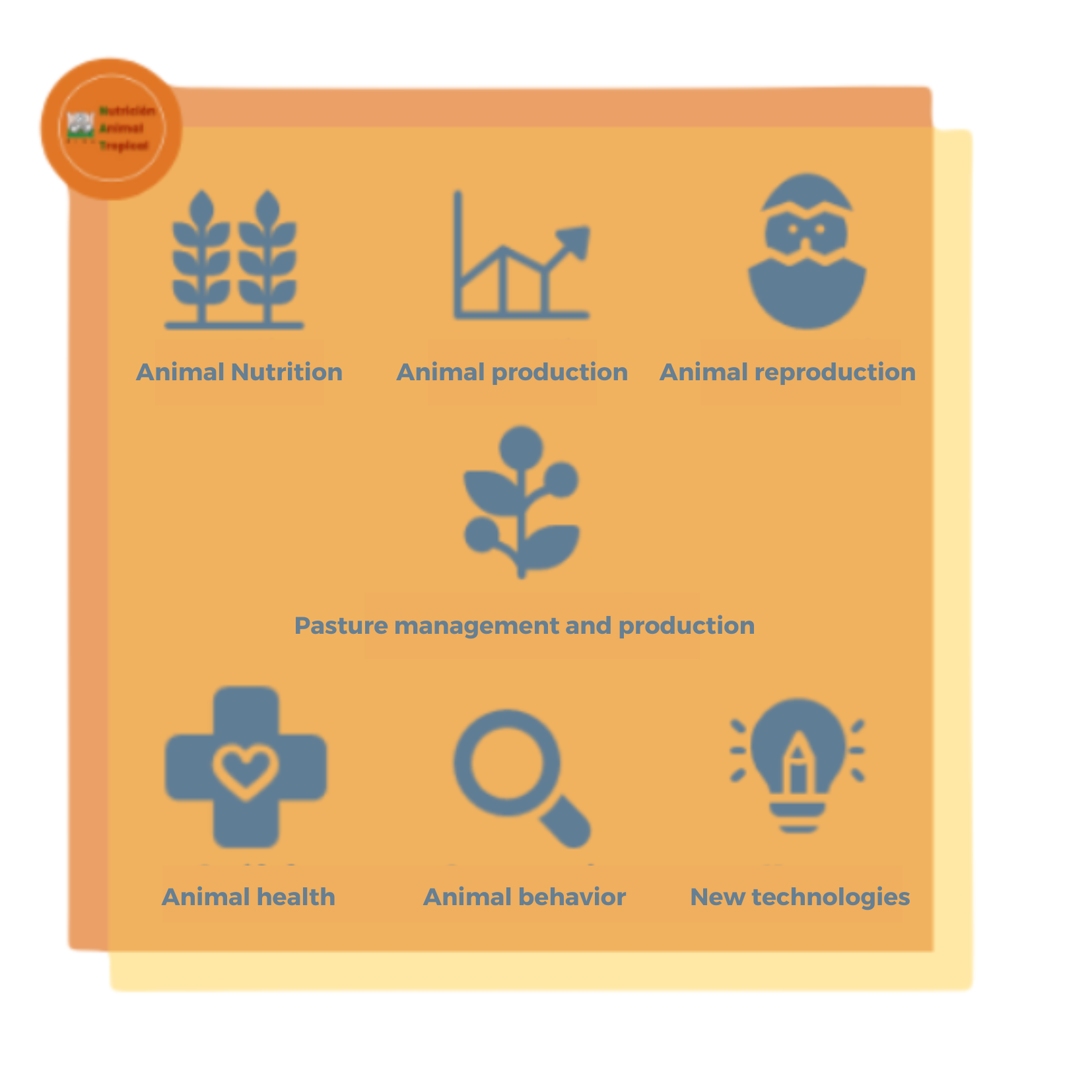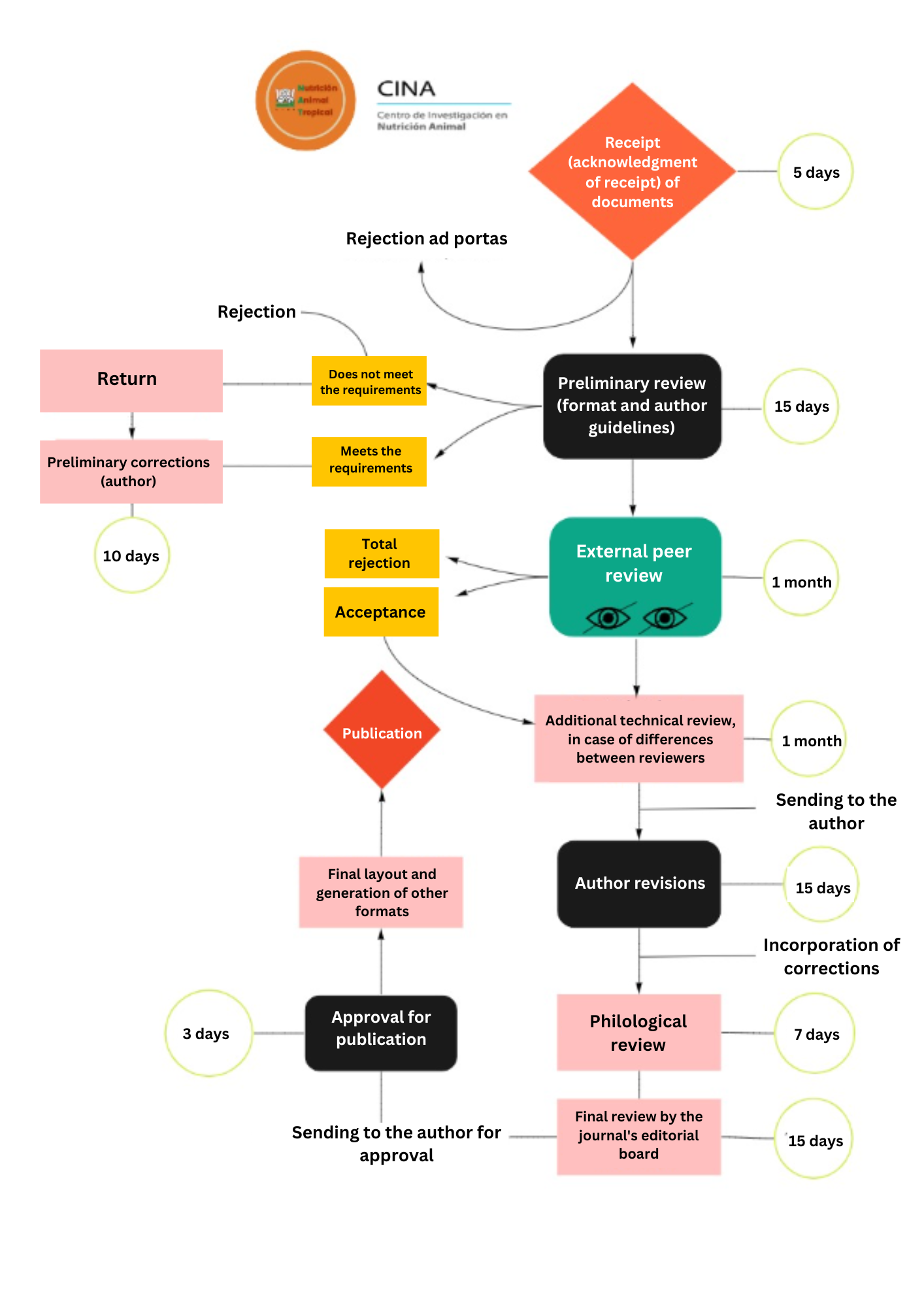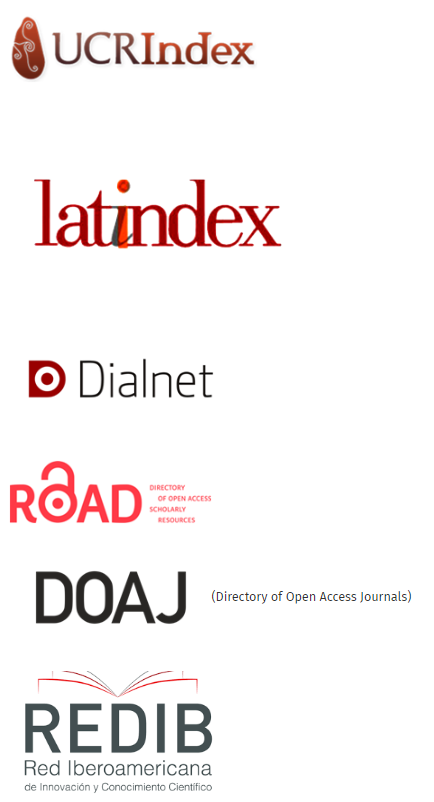Focus and scope

The theme of the Journal includes topics of zootechnical interest, such as animal nutrition, productive and reproductive management, modern technologies, management and production of pastures, alternative species, health, and traditional and alternative ingredients for animal feed, among others. The objective is to disseminate the research carried out at the Center for Research in Animal Nutrition (CINA) of the University of Costa Rica.
The magazine is aimed at researchers, teachers, technicians, zootechnicians, veterinarians, and people interested in animal production.
Tropical Animal Nutrition has its own International Standard Number of Electronic Serial Publications or ISSN: 2215-3527.
Peer review process
Upon receiving manuscripts, a preliminary review is made by the editor, this evaluation includes plagiarism detection through the turnitin system. Once the author complies with these corrections, the Editorial Board positively estimates the technical or scientific merit of the work and it is sent for review to two national and/or international specialists, through the double-blind peer review system. The reviewers have a maximum period of one month to indicate the observations or corrections (if pertinent) so that the work is accepted. If approved for publication, the author receives possible suggestions and has 15 business days to correct and resubmit to the journal to give it the final format. The editorial committee, after receiving the modifications, makes the final decision on whether the manuscript is approved for publication. Before publication, the author will receive the document in its final version so that it can offer final recommendations and/or give its final approval. The approximate duration of the entire process is 131 days.
For this evaluation, Tropical Animal Nutrition has an instrument for evaluating articles. Once the manuscript has been evaluated, it is sent back to the journal with the respective observations.
Editorial Process

List of journal reviewers:
Internal evaluators
Ph.D. Catalina Salas Durán. The University of Costa Rica, School of Zootechnics and Research Center in Animal Nutrition. Costa Rica (zootechnical agronomist)
Ph.D. Luis Villalobos Villalobos. University of Costa Rica, School of Zootechnics and Research Center in Animal Nutrition. Costa Rica (zootechnical agronomist)
Ph.D. Sergio Salazar Villanea. The University of Costa Rica, School of Zootechnics and Research Center in Animal Nutrition. Costa Rica (zootechnical agronomist)
M.Sc. Rebeca Zamora Sanabria. The University of Costa Rica, School of Zootechnics and Research Center in Animal Nutrition. Costa Rica (veterinary doctor)
M.Sc. Víctor Rodríguez Lizano. School of Agricultural Economics and Agribusiness (agricultural economist)
M.Sc. Michael López Herrera. The University of Costa Rica, School of Zootechnics and Research Center in Animal Nutrition. Costa Rica (zootechnical agronomist)
M.Sc. Augusto Rojas Bourillón. The University of Costa Rica, School of Zootechnics and Research Center in Animal Nutrition. Costa Rica (zootechnical agronomist)
M.Sc. Rodolfo WingChing Jones, University of Costa Rica, School of Animal Husbandry, Costa Rica.
MBA. Juan Ignacio Herrera Muñoz. The University of Costa Rica, School of Zootechnics and Research Center in Animal Nutrition. Costa Rica (zootechnical agronomist)
Lic. Carlos Campos Granados. The University of Costa Rica, School of Zootechnics and Research Center in Animal Nutrition. Costa Rica (zootechnical agronomist)
Lic. Jesenia Vásquez Vargas. The University of Costa Rica, School of Zootechnics and Research Center in Animal Nutrition. Costa Rica (zootechnical agronomist)
Ing. Javier Paniagua Molina. The University of Costa Rica, School of Agricultural Economics and Agribusiness (agricultural economist)
National External Evaluators
Ph.D. Anthony Valverde Miranda. National University, School of Agricultural Engineering (zootechnical agronomist)
Ph.D. Ismael Hernández Venereo. Consultor at Organix CR
Ph.D. Helven Naranjo Madrigal. National University, master's in marine and Coastal Sciences and Consultant at ALNA S.A.
Ph.D. Manuel Ruiz Paz. A retired official of the Inter-American Institute for Cooperation on Agriculture (IICA) (agricultural engineer specializing in animal nutrition)
Ph.D. Anthony Valverde Abarca. Technological Institute of Costa Rica (zootechnical agronomist)
Dra. Aida Chaves Hernández. National University, Agricultural Sciences (veterinarian)
Dr. Ronaldo Chaves Ledezma. National Animal Health Service (SENASA), MAG (veterinarian)
M.Sc. Sofía Macaya Quirós. DSM Nutritional Products Costa Rica (zootechnical agronomist)
M.Sc. Rodrigo Rosales Rodríguez. San Francisco de Asís School of Veterinary Medicine (zootechnical agronomist)
M.Sc. Nelson Peña Navarro. National Technical University, Research Area, Pacific Headquarters (zootechnical agronomist)
M.Sc. Miguel Vallejo Solís. LMN Gestarse S.A., president (zootechnical agronomist)
M.Sc. Miguel Castillo Umaña. National University, School of Agrarian Sciences. Costa Rica (zootechnical agronomist)
M.Sc. Jeffry Sánchez Salas. Bayer Animal Health Costa Rica (zootechnical agronomist)
M.Sc. Emily Jiménez Loaiza. Laboratorios Faryvet S.A. Costa Rica (veterinary doctor)
M.Sc. Eduardo Corrales Brenes. Tropical Agricultural Research and Teaching Center (CATIE). Costa Rica (statistical)
M.Sc. Óscar Cambronero Independiente (zootechnical agronomist)
Ing. Sergio Abarca Monge. National Institute for Innovation and Transfer of Agricultural Technology (INTA)
Ing. Omar Vargas Villalobos. Cooperativa de Leche Dos Pinos R.L. (Zootechnical agronomist)
Ing. Maritza Araya Mora. Directorate of Animal Foods (DAA) -SENASA (zootechnical agronomist)
Ing. Marianela Castillo. Independent (zootechnical agronomist)
Ing. Marcela Andrade Soto. Cooperativa de Productores de Leche Dos Pinos R.L. (Zootechnical agronomist)
Ing. Luis Alejandro Rodríguez Campos. Independent (zootechnical agronomist)
Ing. Jose Pablo Jiménez Castro. National University, School of Agrarian Sciences. Costa Rica (zootechnical agronomist)
Ing. Jorge Morales González. National Institute for Innovation and Transfer of Agricultural Technology (INTA)
Ing. Gustavo Ruiz Sánchez. Independent (zootechnical agronomist)
Ing. Felipe Vaquerano Pineda. Technological Institute of Costa Rica, School of Agribusiness (zootechnical agronomist)
Ing. Andrés Alpízar Naranjo. National University, School of Agrarian Sciences. Costa Rica, (zootechnical agronomist)
Ing. Fabián Salas. VYMISA, vitamins and minerals (zootechnical agronomist)
International
Ph.D. Carolina Feoli. CSA Animal Nutrition, Ohio. U.S
Ph.D. Mattew Poore. North Carolina, State University. U.S
Ph.D. Leonel Mejía Sánchez. Cobb-Vantress, Arkansas. U.S
Ph.D. Cesar Coto Sánchez. Cobb-Vantress, Arkansas. U.S
Ph.D. Miguel Benezra Sucre. Central University of Venezuela, Caracas. Venezuela
Ph.D. Jairo Mora Delgado. University of Tolima, Colombia
Ph.D. José Arce Cordero. University of Florida, Florida. U.S
Ph.D. Darwin Heredia. University of Guadalajara, Guadalajara. Mexico
Ph.D. Rocky Lemus. Mississippi State University, Mississippi. U.S
Ing. Ana María Cascante Amador. Salmon Enterprises. Tasmania
Ing. Ana Margarita Arias Esquivel. University of Florida, Florida. U.S
Publication frequency
The Journal has continuous semi-annual periodicity, which means that the elements will be published as the material is accepted. The opening of the first number of each year takes place in January and closes in June. The opening of the second issue takes place in July and closes in December. Two numbers are published a year.
Open access policy
The Tropical Animal Nutrition Journal adheres to the open access policies of its publishing house, the University of Costa Rica. Open access documents are all those that provide unrestricted availability of their content. Open access to the publications of this journal offers the opportunity for the documents to be freely downloaded, read, and cited, by all the people who so wish, as long as the information published here is not used for profit, as well as the original document and its author must be cited.
In a complementary way, the magazine has the use of the Creative Commons license. The user can read, download, store, print, search, index, and create links to the full texts, as long as this is carried out without commercial purposes and the source and the person in charge of its authorship are cited. (License: https://creativecommons.org/licenses/by-nc-nd/4.0/).
This makes the research freely available to the public, fostering greater global knowledge exchange.
Indexed / Summarized in

Abstracts on Hygiene and Communicable Diseases
Bio-Control News and Information
Grasslands and Forage Abstracts
Nutrition Abstracts and Reviews Series B: Livestock Feeds and Feeding
Soils and Fertilizers Abstracts
Review of Agricultural Entomology
Repositories:
- Kerwá
- Kimak
- LA Referencia (Network of repositories of open access to science)
Searchers:
Interoperability protocol
By using DublinCore type metadata tags, it makes use of the OAI-PMH interoperability protocol
OAI-PMH URL: https://revistas.ucr.ac.cr/index.php/nutrianimal/oai
Digital preservation
It has the digital backing of the Kerwá repository of the University of Costa Rica, and the OJS journal administration and publication system. Annually the Journal sends a CD, with the respective numbers, to the National Library System (SINABI); so, there is a backup of the manuscripts.
Additionally, the Journal is supported by digital platforms for the preservation of permanent digital content:
- LOCKSS (Lots of Copies Keep Stuff Safe)
- CLOCKSS (Controlled Lots of Copies Keep Stuff Safe)
Similarly, there is a digital backup on the DropBox platform.
Tropical Animal Nutrition
Topics related to animal production and its derivative products aimed at zootechnicians, researchers, technicians, veterinarians, and people with an interest in the agricultural sector
Ethical Codes
The Tropical Animal Nutrition Journal adheres to its ethical principles, which are based on the Principles of Transparency and Best Practice in Scholarly Publishing by the Committee on Publication Ethics (2019).
Duties of the editor:
The editor will be responsible for everything published in the journal, he or she must strive to continuously improve the quality standards of the journal, always ensuring the veracity of the published content. In this way, the editor may reject or accept works as previously established in the Format Guide for the Journal, thus without distinction by gender, sex, political or religious ideology, sexual orientation, or nationality of the authors. For all those texts that comply with the publication format, the editor must send them to national or international specialists of their choice, for review and subsequent acceptance, the editor must seek a fair and prompt review of the contents. Throughout the entire process before publication, the editor must guarantee the confidentiality of the contents, as well as the names of the authors interested in publishing, the names of the reviewers involved, and any other information related to the document under review.
Duties of the members of the Editorial Board:
The members of the Editorial Board are responsible for verifying the authenticity of each of the documents received, they must collaborate in the assignment of national or international reviewers that best fit the topic proposed by the author, as well as they must assist in the review process when your specialty allows it. The members of the Board must ensure the well-being of the journal, support the continuous improvement of the content quality assurance processes, and seek to maintain the integrity of the journal in the process, committing to professional ethics rather than interests. commercial, personal, or economic.
Author's duties:
All those authors interested in publishing their content in the journal must adhere to the Format Guide established by the journal and respect all the guidelines proposed in it. The authors guarantee that all the authors involved authorize the publication, as well as that the information presented is original and that it has not been published in other journals. The authors are responsible for citing and including in the list of bibliographic references of the document of interest, all the data, and information of other authors that have been used in the preparation of the document, in the same way, the falsification of words and information from third parties will be considered plagiarism. Authors must send the manuscripts to the email address indicated in the section: Guidelines for authors, as well as accept the terms circumscribed by the Journal.
Reviewers Duties:
The reviewers must verify that the content of the document they have received complies with the ethical and quality standards of the journal, and they must notify the editor of the journal of any unethical behavior or plagiarism detected in the manuscript in their charge. . Upon receiving a document review request, they must promptly communicate whether they accept or reject the request. In case of acceptance, the reviewers must evaluate the contents objectively, the observations made must be constructive and substantiated, and if there is a conflict of interest or authorship, they must notify it before carrying out the review. The reviewers must voluntarily accept the documents assigned to them without financial compensation.
Inadmissible situations:
The Tropical Animal Nutrition Magazine will ensure and guarantee transparency and the correct application of the Code of Ethics, therefore the following actions are considered inadmissible:
Plagiarism: appropriating a work, someone else's idea, processes, results, or words of another person without giving them credit. The journal is within its right to reject documents that have been identified as possible plagiarism. Similarly, the author of the document is allowed to amend it with bibliographic citations.
Falsification of information: altering, modifying, or falsifying certain essential data of a document.
Simultaneous publications: submitting the same article to the editorial process in different journals at the same time.
Conflict of Interest: Situation linked to human relations that generates an ethical and moral conflict, endangering the transparency and veracity of the study data.
In case any of these mentioned practices occur, the Editorial Committee will be informed and a decision about the manuscript will be made, it will be withdrawn from the Journal, even if it has already been published. The situation will be verified and verified and the decision made will be notified in writing to the main author. Some publication penalties could be generated for the author in the Journal.
Sponsors
N/A
Journal History
The Tropical Animal Nutrition Magazine was created in 1994 as an initiative of the Animal Nutrition Research Center (CINA). The main objective was the dissemination of knowledge in animal nutrition in Costa Rica, within the reach of producers and technicians of livestock companies. The last publication was Volume 6, number 1 of the year 2000. From that moment on, CINA has gone through stages of momentous changes (accreditation process, new directors, retirement of researchers, and editorial staff) that caused the journal to suffer a discontinuity.
In 2013, the revival of the journal arises as a new vision of projection, where it is desired to reflect the investigative work of a renewed body of researchers from CINA, which has the support and experience of some of the original members of the Editorial Board. As in its first edition, the Editorial Board invites national and international technicians, professionals, and researchers to participate in this dissemination medium to publicize research results and address topics of zootechnical interest.
